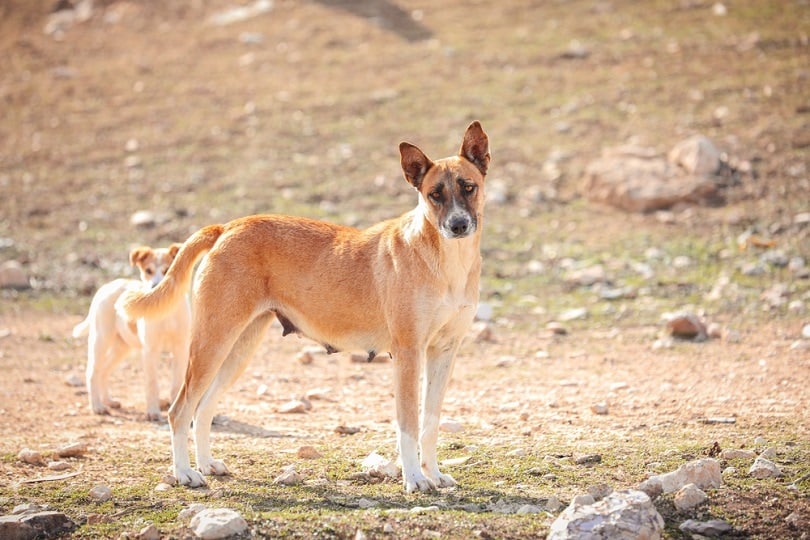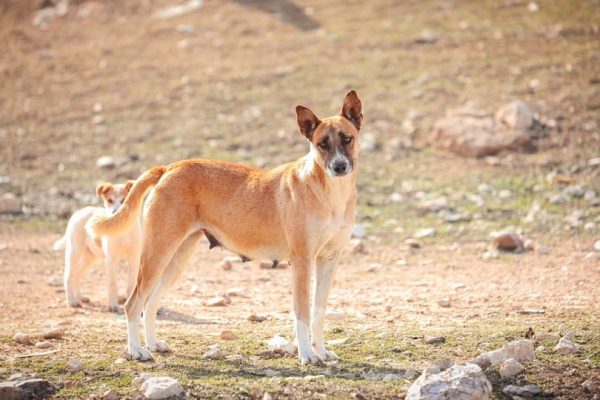Click Below to Skip Ahead
If you’re looking for a dog that won’t just be a beloved member of the family but also a watchdog, consider the Canaan Dog. This is a rarer breed, so they’re a bit challenging to locate in the United States, but they make both loyal pets and alert watchdogs. The breed is devoted to their people, only moderately energetic, and constantly vigilant. They aren’t always best for first-time dog owners, though, as they can sometimes be a handful during training.
Want to learn more about this breed so you can decide if they’re right for you? Here’s a closer look at the Canaan, their temperament, needs, and more. Keep reading!
Breed Overview
Height:
19 – 24 inches
Weight:
35 – 55 pounds
Lifespan:
12 – 15 years
Colors:
White, tan, red, black, cream, golden, liver
Suitable for:
Moderately active families, people with yards, those seeking a watchdog
Temperament:
Confident, intelligent, alert, devoted
This breed is the national dog of Israel and has been around since ancient times. They have quite a fascinating history that involves everything from working as herd and guard dogs to being sent out into the desert to survive on their own for many years. A combination of sweet, shy, loyal, and alert, this is a breed that can make a fantastic pet for many.
Canaan Characteristics
Canaan Puppies
Canaan Dogs are rarer in the United States, so the chances of finding one at your local shelter aren’t great. It’s still a good idea to check, though, just in case. After checking at your local shelter, you may want to try one of the few Canaan dog rescue organizations. You might not be able to find a puppy through a rescue, though, as they are more liable to have adult dogs.
If you want a puppy, you will probably need to adopt via a reputable breeder. Reputable breeders will ensure the health of your puppy and provide a safe environment for them to spend the first few weeks of their lives. Watch out for any breeders who don’t want to answer your questions or let you see where the puppy has been living, though!
Canaan Origin & History
Canaan Dogs came from Canaan, or what is known today as Lebanon and Israel. Flocks and herds were abundant for those living in Israel during biblical times, so they required dogs to help them herd and guard all those animals. How do we know the Canaan Dog was around? There are artifacts from approximately 4,000 years ago that contain inscriptions that closely resemble this breed! However, no one knows for sure when the Canaan Dog first appeared.
When the Roman Empire came in the year 70 and destroyed Jerusalem, the people living there were dispersed across the Middle East, and the Canaan Dogs living amongst them were left on their own. As a result, these dogs took refuge in the Negev Desert, where they not only survived but lived undomesticated until the 20th century arrived. They were eventually re-domesticated to become sentry dogs for the Israeli army that was forming at the time.
Temperament & Intelligence of the Canaan 🧠
The Canaan Dog is docile with their human family but alert and somewhat aloof with strangers. The Canaan makes a fantastic watchdog because of these traits and the breed’s devotion to their family. Just be careful, though; if you don’t firmly assert yourself as the alpha of the household, your pup will make themselves the alpha and decide who they want to be around you and the rest of the family. The breed is protective and can sometimes be territorial. However, these pups aren’t aggressive, so no need to be concerned about that. They much prefer standing back and barking to let you know someone has come around to being aggressive.
Canaan Dogs are affectionate and loving with their families but shy when meeting new people. They’re also highly athletic, so they’ll love to play, particularly if play involves agility training or running. These dogs are also quite intelligent, which can come in handy during training.
Are These Dogs Good for Families? 🏡
Canaan Dogs make great family pets, as they can get along with children and will consider them to be part of their pack. This breed will do best being socialized early if there are kids in the home, though. Because these dogs are herding dogs, there’s a chance they may occasionally try to herd children, so be sure to always keep an eye on kids and dogs playing together. The Canaan will also be super protective of little ones in the home.
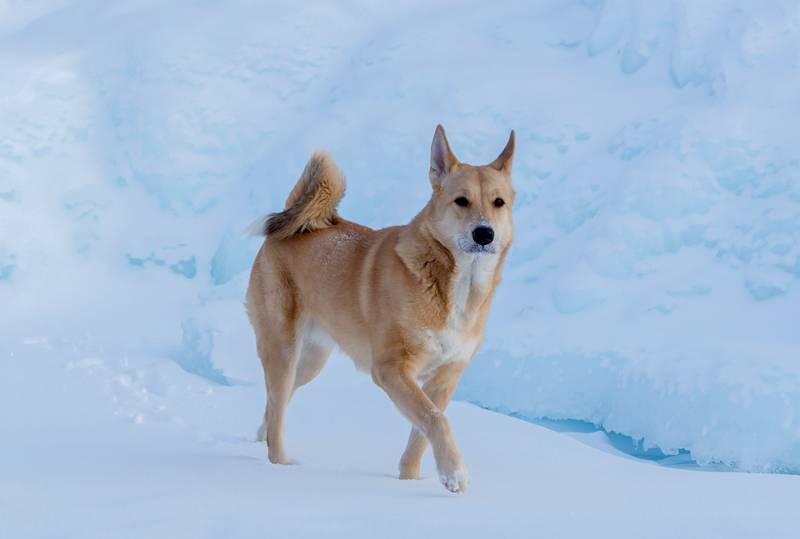
Does This Breed Get Along With Other Pets? 🐶 😽
While the Canaan Dog can get along with other dogs and even felines, they prefer being the only pet in the home. Plus, due to their prey drive and hunting instincts, if not trained well enough, they may chase after smaller animals. However, if you want to add a Canaan to a home that already has other pets in it, early socialization and training are vital.
Things to Know When Owning a Canaan:
There’s a lot to know about owning any dog breed, and the Canaan Dog is no different. Here, you’ll learn what to feed these canines, how easy they are to train, and more!
Food & Diet Requirements 🦴
The Canaan requires a diet consisting of high-quality dog food rich in protein. Feeding them food that is age and size-specific is a good idea. These dogs can sometimes be prone to becoming overweight, so be careful how much you feed them. Speak with your vet about how much they should be fed each day to meet their nutritional needs.
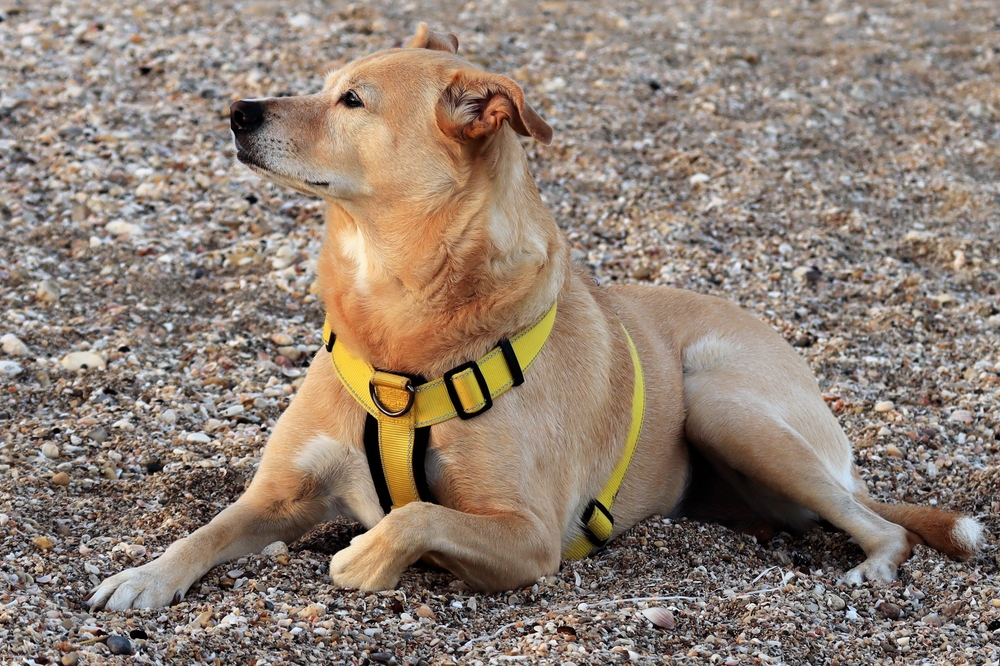
Exercise 🐕
While Canaans are energetic, they’re only moderately so, which means you don’t need to exercise them for hours a day. 30 to 45 minutes a day of exercise should be plenty for these pups. That could consist of a morning and evening walk, a game of chase in the backyard, or playing fetch.
Because this breed is intelligent and athletic, they’ll love doing activities such as agility courses, nose work, or obedience classes. Signing your pup up for such activities can be an excellent way to help them work off energy.
Training 🎾
While you should use positive reinforcement with all animals during training, it’s especially important to do during training with a Canaan Dog. These canines can be quite sensitive; if yelled at, they could shut down. The breed’s intelligence will help immensely during training, though. However, these pups have a tendency to become bored during training, as they’d rather do their own thing, which can complicate the process. Making things more challenging can help them focus on training, though.
Early training and socialization are essential with this breed due to their wary and alert natures. Without it, you’ll have a dog who mistrusts every stranger they meet, as well as one who doesn’t listen to you. If you realize you need a hand with training, reach out to a professional trainer. The Canaan Dog can sometimes be a challenge for novice dog owners, so having a professional lend their expertise can be highly beneficial.
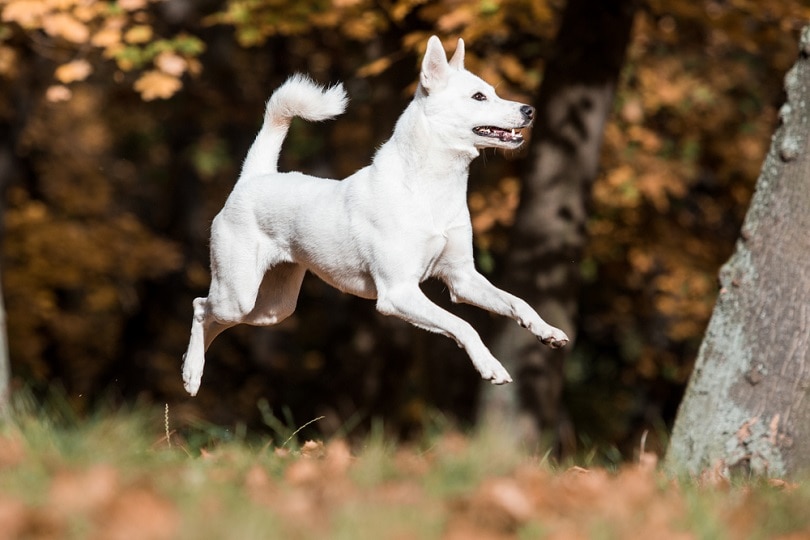
Grooming ✂️
The Canaan has a double coat but only sheds moderately (and mostly once a year). So, brushing them a couple of times a week should suffice, except for the shedding period when they should be brushed daily. The great thing about this breed is that they don’t tend to get very dirty or smelly (unless they roll around in something), so you don’t need to bathe them as frequently as some other breeds. The only other grooming you should need to do for your pup is brushing their teeth regularly and keeping their nails trimmed.
Health and Conditions ❤️
This breed is quite healthy, partially because there are only a few breeders for these dogs, and those breeders tend to stay in touch with each other about any issues that arise. However, all canines can be prone to certain illnesses. Here are a few that the Canaan may develop.
- Cryptorchidism
- Osteochondritis dissecans
- Epilepsy
- Hypothyroidism
Male vs Female
There won’t be much difference when it comes to temperament in the male and female Canaan. The only significant difference you’ll see is that the male dog is larger and heavier than the female dog. Keep in mind, too, that there will be a difference in how much you’ll pay to have a male or female dog fixed. Spaying is usually more expensive than neutering.
3 Little-Known Facts About The Canaan
What else is there to know about the Canaan? Lots! Here are three facts you might not have known.
1. These canines are also known as biblical dogs.
And there’s archaeological evidence that the Canaan was around during the days in which the Bible was written. 700 dog skeletons were discovered near Tel Aviv that date back to the 5th century BC, and there are rock carvings from the 1st century in Sinai that depict the breed.
2. You’ll also find drawings of these dogs in tombs.
Tombs at the ancient Egyptian cemetery known as Beni-Hasan contained artwork that resembles the Canaan. The drawings date back to 2200–2000 BC.
3. The Canaan was called Kelef Kanani in their earliest years.
This is the name the breed went by in ancient times in the Middle East. “Kelef Kanani” is Hebrew and translates to “Canaan Dog”!

Final Thoughts
If you’re an experienced dog owner, you may want to consider adopting a Canaan Dog. This breed makes a wonderful pet for people who have had dogs, families, and even those looking for a watchdog. The Canaan may be affectionate and docile with their people but are quite wary of everyone else. Between that wariness and their general vigilance, they’ll bark often when new people come around.
With their families, though, the Canaan will enjoy walks, playing, and learning how to do things such as agility training. They get along fine with kids (though not so much with other animals). Training these pups can sometimes be difficult for novice dog owners, but early training and socialization are key so these dogs can develop healthy relationships with others.
Featured Image Credit: ousefsh, Shutterstock

